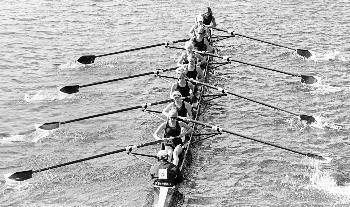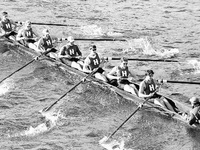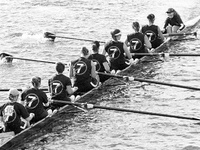
The Radcliffe lightweight boat ranked first among collegiate crews at Head of the Charles this week, including victories over defending national champion Princeton and rival Wisconsin.
On one of the most celebrated weekends of the crew season, the Harvard Crimson and the Radcliffe Black and White rose to the occasion and turned in solid performances against premier competition in the 38th Annual Head of the Charles Regatta.
In particular, both lightweight crews finished with outstanding performances, beating archrivals in both divisions.
Harvard
Unlike Saturday’s dreary weather, yesterday the Charles River featured clear skies and only a gentle breeze against the direction of the rowers.
Harvard’s eight boats performed well, but came up short of winning any titles.
The varsity lightweight boat was seeded sixth, but staged an exceptional race to finish second, behind only the New York Athletic Club.
In second place after the first leg and in first at the midway point, the Crimson seemed poised to challenge for first. The New York Athletic Club, however, posted superior times in each of the final two legs and pulled away for a six-second victory, leaving Harvard in second.
Defending national champion Yale fell to fourth while Brock University Rowing Club finished third.
In the Men’s Championship Eight, the Crimson ‘A’ boat, ranked third, turned in a strong effort, but found itself in fifth place when all was said and done.
The top-ranked U.S. Rowing team finished more than seven seconds ahead of a tightly bunched pack.
Defending Eastern champion Wisconsin and Charles River rival Northeastern found spots among the top crews, as they placed second and third respectively. Last year, Harvard earned the unofficial title as “fastest crew on the Charles” when the Crimson beat the Huskies during the spring dual season.
“It’s a little difficult,” said Harvard heavyweight coach Harry Parker. “Some of the events you have elite level crews, national teams—the United States, Canada, Germany.”
In this race, and for much of the day, Harvard’s rowers suffered as a result of falling behind early and never fully recovering. The Crimson fell five seconds off the lead by the end of the first leg, and 12 by the beginning of the fourth.
A strong effort moved Harvard’s boat one second closer to the U.S. boat, but still a distant 11 seconds behind.
The heavyweight second varsity boat, in the 11th seed and racing under the Charles River Rowing Association moniker, fell 13 seconds behind by the end of the first leg, a deficit which continued to grow as the race progressed.
The squad eventually finished 39 seconds off the winning pace and in 16th place.
In the Men’s Youth Eight, Harvard’s top-seeded freshmen heavyweight boat captured an early lead, more than eight seconds ahead of its nearest competitors.
However, Homberger RK roared back from behind and, posting the top times in each of the final three legs of the race, won by more than 13 seconds.
Meanwhile, the Crimson jostled with Brown’s squad for second place. Losing after the second leg, the Crimson took less than a second’s lead into the fourth leg, but was nipped at the wire, missing the runner-up
spot by less than half a second.
Harvard’s freshmen lightweight boat, seeded No. 31, started poorly and fell nearly a minute off the pace after the first leg. The team never recovered, finishing in 27th place, more than 100 seconds behind the winners.
The Crimson entered three boats in Saturday’s competition and found mixed results. Saturday’s racing was marked by overcast skies, a strong tailwind and a current flowing in the direction opposite the rowers.
Harvard entered two boats in the Men’s Collegiate Eight, one lightweight and one heavyweight.
The heavyweight squad, composed of freshmen and seeded second, raced under the name “Charles River Rowing Association” and placed 15th.
The team suffered from a lack of stamina and fell 10 seconds further off the lead at each of the measured points, finishing more than 40 seconds behind the winning Hobart boat.
The lightweight boat did not fare much better. After starting 14th, the crew sunk 15 seconds off the pace over each quarter of the course and finished in 19th place, one minute behind the leaders.
The Crimson performed better in the Men’s Club Eight, but again did not live up to its billing.
Ranked first, Harvard was passed by second bow ASR Nereus before the first marker and never recovered.
A strong performance over the second leg moved Harvard within eight seconds of the lead with approximately half the course to go, but the Crimson could neither move closer nor maintain the faster pace.
ASR Nereus turned in the fastest times for each of the two final stretches of the course and pulled away from the field, with the Crimson slowly dropping back, finishing seventh, over twenty seconds behind.
Parker entered the day with diminished expectations, primarily looking to increase his rowers’ experience.
“It’s very early in the training cycle for us,” Parker said. “It’s early in the year, so we’re really not ready to race and we don’t put a heavy emphasis on trying to win any particular event.”
Parker took sixth in the Men’s Veteran Single. Parker began the race strong, only a few seconds off the lead, but eventually dropped back after failing to maintain his pace.
Radcliffe
Though the rowing season is still young, the Radcliffe lightweight crew accomplished yesterday what it could not all of last season—beating both Princeton and Wisconsin.
The three lightweight powerhouses have been locked in a battle for the pinnacle of the women’s crew scene, the Black and White have almost always been left black and blue after taking on its two archrivals.
Last year, Radcliffe could muster only a single victory over national champion Princeton and was defeated by Wisconsin on every occasion.
At the Head of the Charles, the Black and White finished second only to the Riverside Boat Club, that dominated the race from start to finish, building an early seven-second lead and stretching it to a winning distance of 25 seconds.
Radcliffe battled its way up from the fourth seed and out of a tightly knit pack of four boats. Princeton got out to a fast start after being relegating to the seventh bow number due to a poor finish last year. However, the Tigers placed only third while the Badgers turned in a fourth-place performance.
In the Lightweight Fours, the Black and White started sixth, but once again trailed by nearly 30 seconds at the end of the first leg. The team spent much of its time moving up and down between sixth and eighth place before finally settling into eighth, nearly 90 seconds off the lead.
In the Women’s Championship Eight, Radcliffe’s two heavyweight entries performed better than expected, but still finished well behind the leaders. The U.S. national team took first while London Training Center took second, followed by Yale.
The Black and White “A” boat, beginning 23rd, maintained a pace 12 seconds slower than that of eventual victors U.S. rowing. The crew finished 48 seconds behind for eleventh place.
Radcliffe’s “B” entry started 36th and fell quickly off the pace. Twenty-five seconds behind after the first leg, the crew finished in 23rd place, nearly a minute and a half out of first place.
The Radcliffe heavyweights entered a novice boat in the Youth Eight, which, like many of the Harvard boats, fell behind quickly and was never a major factor in the outcome of the race.
Ranked second, the Black and White fell 25 seconds off the lead by the end of the first leg, a deficit which grew to just over 60 seconds by race’s end, placing the Black and White in a disappointing 15th place.
Heavyweight coach Liz O’Leary rowed for the 1980 Rowing Club in the Master Eight. Her boat placed fifth.
The women’s competition was marked by protest of Ivy League guidelines which mandate that all conference teams have periods of rest—formerly seven weeks, now 33 days—from their athletic schedules.
“I have friends who sing the same amount of time I cox and they’re not asked to take time off for their studies,” said freshman Rebecca Zeidel, the coxswain for the novice women.
All Ivy League women wore jerseys featuring a crossed-out seven as a sign of their objection.
The competitors bemoaned the distinction drawn between the Ivy Leaguers and the rest of the collegiate athletic world.
“It’s feeding into the negative academic stereotype of athletes that somehow athletes cannot do other things,” heavyweight co-captain Courtney Brown said. “It’s something we choose to do. We’re an NCAA team, not just Ivy League.”
Read more in Sports
Harvard Athletes Debate at IOP














